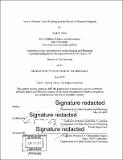Terra ex machina : land building and the breach of property regimes
Author(s)
Allen, Nick B. (Nicholas Bradley)
DownloadFull printable version (10.50Mb)
Alternative title
Land building and the breach of property regimes
Other Contributors
Massachusetts Institute of Technology. Department of Urban Studies and Planning.
Advisor
Gabriella Y. Carolini.
Terms of use
Metadata
Show full item recordAbstract
Land building is the infilling of littoral or wetlands systems with developable dryland. It has long been used by state actors to overcome territorial constraints and conquer "wastelands" for economic development, but is increasingly used for large-scale, privately-financed real estate development. For these projects, land building is especially advantageous to both state and development interests because it can bypass traditional land acquisition and because it is unencumbered by prior legal claims, uses, or ecological functions. Compared to inland property, the relative mobility of built land makes it better suited to market-led development. This thesis frames land building as a "geo-hack": it exploits a false premise of planning and property regimes - that land is fixed in place and quantity - and thereby circumvents both. This work situates offshore land building on the Malay Peninsula within its history of land alienation, the practice of expanding commercial landholdings by extinguishing customary land uses and ecological functions. Focusing on the peninsular state of Johor, I analyze tensions between the agrarian property regime created by land alienation and recent real estate development pressures. I then turn to the case of Forest City, a large-scale real estate development being built in the straits between Johor and Singapore. By exploiting Malaysian land alienation procedures, the developer fully captures an unexploited rent gap and the state government avoids directly contending with social costs that usually accompany large-scale real estate development. However, my thesis shows that these gains are realized only by overwriting existing production regimes and exposing all actors to global market risks.
Description
Thesis: M.C.P., Massachusetts Institute of Technology, Department of Urban Studies and Planning, 2017. Cataloged from PDF version of thesis. Includes bibliographical references (pages 87-95).
Date issued
2017Department
Massachusetts Institute of Technology. Department of Urban Studies and PlanningPublisher
Massachusetts Institute of Technology
Keywords
Urban Studies and Planning.